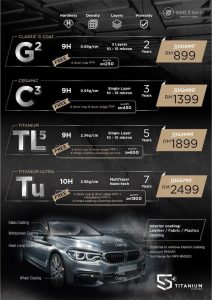TSER Window Tint Malaysia
is a crucial term you’ll encounter when browsing car tint options — but many car owners don’t fully understand what it means or why it matters. TSER, which stands for Total Solar Energy Rejected, is one of the most important indicators of a window film’s ability to block heat from entering your vehicle. It combines three major factors: visible light, infrared, and ultraviolet energy — giving you a complete picture of how well a tint performs in real-world conditions.
So, why should Malaysian drivers care about TSER? Because in our hot, humid climate, it’s not enough for a tint to just “look dark.” Without a high TSER rating, your car cabin can still heat up quickly, causing discomfort and reducing air conditioning efficiency.
If you’re serious about long-term comfort, fuel savings, and protecting your interior, understanding TSER is essential. Let’s break it down further and help you make a smarter, performance-driven tinting choice.

1. What Does TSER Stand For?
TSER stands for Total Solar Energy Rejection.
It measures how much total solar energy (heat + UV + visible light) the window film can block from entering your car.
✅ A higher TSER percentage means better heat rejection and greater interior cooling.
2. What Does TSER Actually Measure?
TSER is made up of three components:
-
Infrared Rejection (IRR): Blocks heat-causing infrared rays
-
Ultraviolet Rejection (UVR): Blocks harmful UV rays that cause skin damage and interior fading
-
Visible Light Control: Reduces glare and excess sunlight
Important:
TSER is NOT just about darkness.
A darker film doesn’t automatically mean better TSER!
✅ A good film can be light in color but still reject high heat if the technology (like Nano-Ceramic or Sputtered layers) is advanced enough.
3. Why is TSER So Important in Malaysia?
Malaysia’s climate is hot, humid, and sunny most of the year.
High temperatures plus strong UV exposure can:
-
Make your car interior dangerously hot
-
Increase air-conditioning load (higher fuel consumption)
-
Cause dashboard cracking, seat fading, and material deterioration
-
Affect your driving comfort and health
✅ A high-TSER window tint keeps your cabin cooler, protects your interior, and reduces reliance on your air-conditioning — saving fuel and improving comfort.
4. How to Choose Window Films Based on TSER
When choosing a car window tint:
-
Always ask for the TSER rating, not just “how dark” the film looks.
-
Premium films usually offer TSER ratings above 50% — some can even achieve 60–70% TSER.
-
Cheap tints might only block visible light without effectively reducing infrared heat — giving you low TSER and poor real-world performance.
✅ Shield Smith premium window films are carefully selected for high TSER values to handle Malaysia’s extreme climate.
5. Bonus: TSER vs IRR — What’s the Difference?
Many people confuse TSER with IRR (Infrared Rejection).
| Term | What It Means |
|---|---|
| IRR (Infrared Rejection) | Measures how much infrared radiation (heat energy) is blocked. |
| TSER (Total Solar Energy Rejection) | Measures total heat + UV + visible light rejection — overall cooling performance. |
✅ TSER is the more complete measurement for real-world car cooling performance.
When shopping for tints, focus on TSER to truly know how well a film can keep your car cool — not just IRR alone.
Final Thoughts: TSER is the Real Benchmark for Comfort
If you want real heat rejection — not just darker windows — choose your window tint based on TSER ratings.
✅ High TSER = Cooler interior
✅ High TSER = Better protection against UV and fading
✅ High TSER = More driving comfort and better AC efficiency
At Shield Smith Malaysia, we offer window films with outstanding TSER performance — engineered specifically for Malaysian roads and weather.
Multilayer Sputtered Window Film
** Installement Plan Up To 24 Months**





